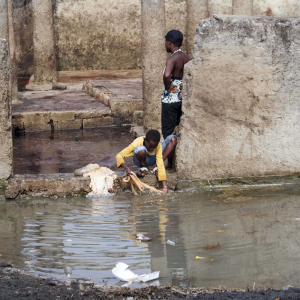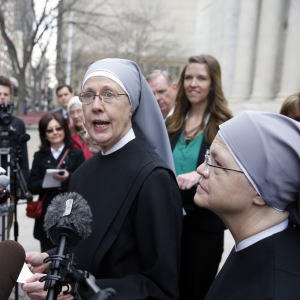A political solution may be the key to unlock the case of the Little Sisters of the Poor whose case against being forced to offer no cost birth control as part of a healthcare package for staff under Obamacare will be heard in the Supreme Court today.
Robert J. Muise, a co-founder and senior counsel of the American Freedom Law Center, which represents Priests for Life, called the contraceptive mandate of the Affordable Care Act "clearly a case of material cooperation with evil," but conceded that the court may not rule in favour of the women religious and 36 other plaintiffs.
If that occurs, then it will be up to the election of a pro-life president - Muise didn't mention any candidates - who could end the mandate through either executive action or by extending an exemption for nonprofit organizations who object to the mandate on religious grounds. Churches already have the exemption.
"Ultimately," said Father Frank Pavone, national director of Priests for Life, "the solution is the elections and moving the elections in the right way." They made their remarks on Tuesday during an afternoon news conference at the National Press Club.
The contraceptive mandate of the Affordable Care Act requires most employers, including religious employers, to cover contraceptives, sterilization and abortifacients through their employee health insurance.
The Department of Health and Human Services has offered what it calls an "accommodation" or "work-around" that allows objecting employers to acknowledge their opposition to contraceptive coverage by notifying HHS in a letter. This triggers an arrangement for a third party to provide the coverage.
Priests for Life and the other defendants regard that process as a burden on the free exercise of religion.
"Catholic faith, Catholic priests, Catholic objection, but the government is dividing us on the basis of what? Classification under the tax code," Father Pavone said.
John Quincy Masteller, general counsel for Thomas Aquinas College in Santa Paula, California, complained that the government has drawn the religious exemption "more narrowly than ever before," defining it as simply the right to worship without government interference. The Catholic college faces fines of up to $2.8 million a year if it does not comply with the mandate.
"This is not about what we do in church on Sunday," Father Pavone said. "It's also to be free in what we do in business every other day of the week."
Other appellants include East Texas Baptist University, Southern Nazarene University and Geneva College, a Presbyterian institution, and the Archdiocese of Washington, and the dioceses of Pittsburgh and Erie, Pennsylvania.
All cite the Religious Freedom Restoration Act of 1993 in their defence.
RFRA, as the law is called, states that the government "shall not substantially burden a person's exercise of religion" unless that burden is the least restrictive means to further a compelling governmental interest.
KEEP UP TO DATE ON TWITTER AND FACEBOOK...
Follow all the latest news and events from the Catholic world via The Tablet's Twitter feed @the_tablet
Or you can join in the debate at our community page on Facebook




 Loading ...
Loading ...